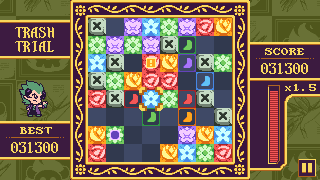Difference between revisions of "Trash Trial"
m |
|||
| Line 5: | Line 5: | ||
=== Rank achievement === |
=== Rank achievement === |
||
| − | Trash trial [[rank|ranks]] are based on total score, as the game can potentially go on indefinitely. The score requirement is multiplied by 0.9 if the player is playing on the [[mini board]], and further multiplied by 0. |
+ | Trash trial [[rank|ranks]] are based on total score, as the game can potentially go on indefinitely. The score requirement is multiplied by 0.9 if the player is playing on the [[mini board]], and further multiplied by 0.7 if the player is playing with [[turbo mode]] enabled. |
{| class="wikitable" |
{| class="wikitable" |
||
Latest revision as of 23:13, 10 July 2021

Trash Trial is a single-player Score Attack game mode where the player must score as many points as possible before getting overgrown by successive waves of garbage.
Rank achievement
Trash trial ranks are based on total score, as the game can potentially go on indefinitely. The score requirement is multiplied by 0.9 if the player is playing on the mini board, and further multiplied by 0.7 if the player is playing with turbo mode enabled.
| 3-wave | 5-wave | 7-wave | 9-wave | |
|---|---|---|---|---|
| No modifiers | 125,000 | 90,000 | 60,000 | 40,000 |
| Mini | 112,500 | 81,000 | 54,000 | 36,000 |
| Turbo | 87,500 | 63,000 | 42,000 | 28,000 |
| Mini turbo | 78,750 | 56,700 | 37,800 | 25,200 |
Strategy
In trash trial, there is a meter on the right hand side that fills up during active time (i.e. whenever actions are not resolving). When this meter fills up, the current score multiplier is increased by 0.1 and garbage equal to the wave size is queued up for the player. Trash trial also uses instant drop—garbage is accepted fully formed, and fills up empty spaces on the board immediately. For this reason, playing with a full board is very risky, and the player must balance building large chains with clearing away the garbage as it comes.
The bar does not fill up while petals are in motion or while clears and chains are in progress, so it is easier to take many turns between waves of garbage by taking advantage of input buffering. On keyboard and controller, this can be accomplished by holding down a push input while a petal is under the cursor. The push will occur on the next frame of active time, meaning the bar will increase by the minimum amount possible before the next turn is taken.
Because of instant drop, non-compact chains may be broken up and triggers may be covered with no warning. As such, it is critical to build chains with compact links so incoming garbage doesn't break them, and building alternate triggers into your chains so you can quickly remove petals from the board is also necessary.